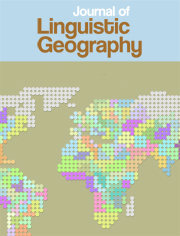Article contents
Cross-dialectal diversity in Mukrī Kurdish I: Phonological and phonetic variation
Published online by Cambridge University Press: 30 September 2021
Abstract
This article provides a comparative overview of phonological and phonetic differences of Mukrī Kurdish varieties and their geographical distribution. Based on the examined data, four distinct varieties can be distinguished. In each variety area, different phonological patterns are analyzed according to age, gender, and social groups in order to establish cross-regional and cross-generational developments in relation to specific phonological distributions and shifts. The variety regions which are examined in the present article include West Mukrī (representing an archaic form of Mukrī), Central Mukrī (representing a linguistically peripheral dialect), East Mukrī (representing mixed archaic and peripheral dialect features), and South Mukrī (sharing features of both Mukrī and Ardałānī). The study concludes that variation in the Mukrīyān region depends on phonological developments, which in turn are due to geographical and sociological factors. Moreover, contact-induced change and internal language development are also established as triggering factors distinguishing regional variants.
- Type
- Articles
- Information
- Copyright
- © The Author(s), 2021. Published by Cambridge University Press
References
- 2
- Cited by





